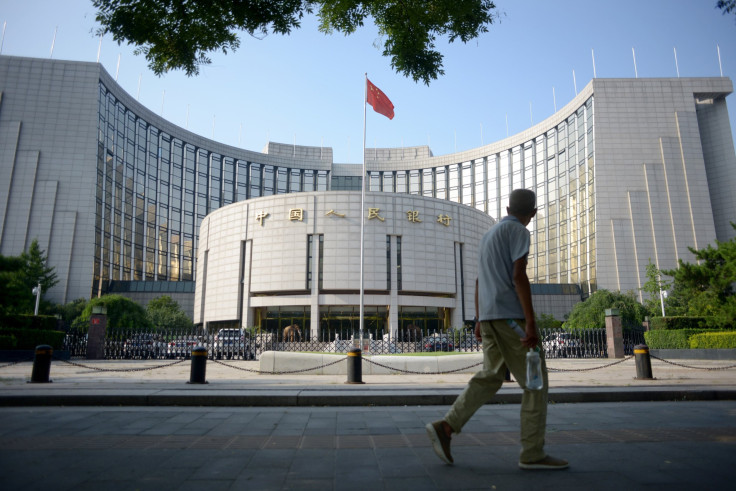China Eases Banks’ Reserve Ratios To Boost Liquidity As Weak Yuan Drags Down Global Stocks

In a move aimed at addressing liquidity concerns in the country, China’s central bank announced Monday it will lower the amount of deposits banks need to hold in reserve by 0.5 percentage points. The move, which comes into effect Tuesday, marks the fifth time the People's Bank of China (PBoC) has reduced the ratio in the last 12 months, and is expected to free up about 700 billion yuan for Chinese lenders.
Although the ratio has been lowered steadily over the past year, the latest cut marks a reversal in the central bank’s stance over the past two months, when it had resisted the use of such aggressive easing tools over fears of stoking further devaluation of the yuan.
In January, for instance, the central bank announced it would carry out open market operations on a daily basis. The operations give PBoC greater flexibility in adjusting short-term liquidity in the banking system.
Moves to weaken the yuan over the past year have fueled fears that the Chinese economy is undergoing a sharp slowdown. Repeated interventions by policymakers have also raised questions about whether China would be able to pull off its shift to an economy oriented toward domestic demand and away from export-led growth.
Meanwhile, global stock markets traded broadly lower Monday after China’s central bank guided the yuan lower for a fifth consecutive session. The move to set the yuan at 6.5452 against the dollar — down 0.17 percent from Friday — came just a day after Beijing dispelled concerns among visiting G-20 finance ministers and central bankers about its battered economy.
At 6:50 a.m. EST, the Chinese currency was quoted at 6.5531 against the dollar, down from Friday’s close of 6.5372.
The weak yuan, coupled with a lack of specific measures to boost growth during the weekend G-20 meetings in Shanghai, hurt investor sentiment Monday. The benchmark Shanghai Composite Index closed down 2.86 percent, approaching the lowest level since November 2014, and the smaller Shenzhen Composite Index plunged 5.4 percent.
“Investors feel disappointed over the lack of good news from the G-20, while the yuan has started to weaken again,” Steve Wang, chief China economist at Reorient Financial Markets in Hong Kong, told Bloomberg. “There are signs of panic buying in China’s property market as prices in large cities continue to rise. A hazy economic outlook prompted some people to sell shares and buy homes, while many stocks remain overvalued.”
Elsewhere in Asia, Hong Kong’s Hang Seng Index closed down 1.3 percent, Japan’s Nikkei 225 finished 1 percent lower, and South Korea’s Kospi Composite index slipped 0.2 percent. India’s S&P BSE Sensex, which dropped 2.8 percent during the day’s trade, pared most of its losses, ending down 0.66 percent.
Meanwhile in Europe, the Stoxx 600 index was trading down 0.27 percent, while the U.K.’s FTSE 100 was down 0.2 percent. U.S. stock futures also followed global stock markets lower Monday, with the Dow Jones and S&P 500 futures trading down 0.2 percent, and Nasdaq futures falling 0.3 percent.
© Copyright IBTimes 2024. All rights reserved.





















